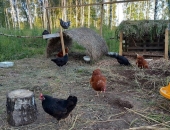
 1
1




“Action on behalf of life transforms. Because the relationship between self and the world is reciprocal, it is not a question of first getting enlightened or saved and then acting. As we work to heal the earth, the earth heals us.” ~ Robin Wall Kimmerer
 5
5




Visit Redhawk's soil series: https://permies.com/wiki/redhawk-soil
How permies.com works: https://permies.com/wiki/34193/permies-works-links-threads
 3
3




Jay Angler wrote:I suggest you think like a mother hen!
Sooo... Will they be the only birds in the high tunnel? Can you put feed out there for them? During the day, a sun-trap might be enough for nap-time particularly if they exhibit the "huddle" tendency. Chickens are "simple" not "stupid" and if you give them access to what they need, they will quite possibly surprise you.
“Action on behalf of life transforms. Because the relationship between self and the world is reciprocal, it is not a question of first getting enlightened or saved and then acting. As we work to heal the earth, the earth heals us.” ~ Robin Wall Kimmerer

 1
1




Heather Sharpe wrote:
Jay Angler wrote:I suggest you think like a mother hen!
.
Thank you, Jay! This has definitely been my attitude, so I appreciate your confirmation I'm on the right track. I think I get thrown off reading things elsewhere on the interwebs and hearing the experiences of friends that bear little resemblance to what we've been doing. The chicks seem so strong! They love foraging and are crazy good at catching bugs. They've caught multiple ones from midair! I hadn't considered that they wouldn't self-regulate on the need for naps with that much stimulation. So thanks for bringing that up. They're not the best at going to bed at night time, seems they freak out and have a hard time getting themselves situated under/around the brooder plate.
They will be the only birds in there and I can put food and water out for them. And their brooder plate, just in case. We will also be very nearby working on their coop, so we can check on them often.
I wholeheartedly agree they are definitely not stupid beings. They've amazed me multiple times with what they understand and are capable of at such a young age. Even without a mother hen to mentor them.
There is nothing so bad that politics cannot make it worse. - Thomas Sowell
Everything that is really great and inspiring is created by the individual who can labor in freedom. - Albert Einstein
 1
1




Kristine Keeney wrote:If your chicks have access to a plate, but choose not to use it, they are fine. If they get cold, they'll huddle or go under the plate.
When you first bring them home, they want to be around 90-95F, and that will drop by 5 degrees every week or so, until they are fully feathered out.
The correct height for a brooder plate, as far as everything I've read, is to keep it at the level of their back. So, even at 2 weeks, they still need it to be pretty low. Now, they get a lot of warmth from movement, huddling, and basking, so I really wouldn't worry much. If they aren't "chick screaming" (the very high pitched peeps that mean "SOMETHING is WRONG!", then you're doing your chickens right. They're fine.
The reason it isn't generally considered a Good Thing to expose them to the outside world too early is simple - they don't have the immune system for it.
I usually start bringing in handfuls of grass and random seed heads, and other things they'll be exposed to, but only once they are growing well and understand the food/water set up. I don't take them outside, generally, unless they are a little older/bigger and I need the break from them.
The high tunnel, especially if it's only used during the day, is fine. If you want to start leaving them outside, then you need to make sure there's a floor, and that all corners/edges/random points are covered, safe (I generally use electrical tape or duct tape around the wire edges), and there aren't any places where they can get caught. on exposed wire.
Once predators notice your little chicken nuggets, they'll never want for nasty bad company. Start early with the mindset.
Kristine Keeney wrote:You are doing great! They are doing great! Relax, Mama Hen. It's good.
Best thoughts,
Kristine
“Action on behalf of life transforms. Because the relationship between self and the world is reciprocal, it is not a question of first getting enlightened or saved and then acting. As we work to heal the earth, the earth heals us.” ~ Robin Wall Kimmerer







 2
2




There is nothing so bad that politics cannot make it worse. - Thomas Sowell
Everything that is really great and inspiring is created by the individual who can labor in freedom. - Albert Einstein
 4
4




"When the whole world is running towards a cliff, he who is running in the opposite direction appears to have lost his mind." C.S. Lewis
Visit https://themaineingredient.com for organic, premium dried culinary herbs that are grown, processed, and packaged in the USA.






